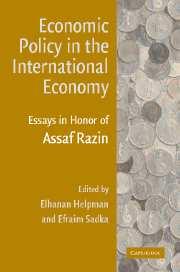Book contents
- Frontmatter
- Contents
- List of Contributors
- Preface
- Introduction
- PART ONE FINANCIAL ISSUES IN OPEN ECONOMIES: THEORY
- PART TWO FINANCIAL ISSUES IN OPEN ECONOMIES: EMPIRICS
- 5 Economic Integration, Industrial Specialization, and the Asymmetry of Macroeconomic Fluctuations
- 6 Uncovered Interest Parity in Crisis: The Interest Rate Defense in the 1990s
- 7 When Does Capital Account Liberalization Help More than It Hurts?
- 8 Sources of Inflation in Developing Countries
- PART THREE ECONOMIC GROWTH: THEORY AND EMPIRICS
- PART FOUR PUBLIC ECONOMICS
- PART FIVE POLITICAL ECONOMY
- Author Index
- Subject Index
6 - Uncovered Interest Parity in Crisis: The Interest Rate Defense in the 1990s
Published online by Cambridge University Press: 03 November 2009
- Frontmatter
- Contents
- List of Contributors
- Preface
- Introduction
- PART ONE FINANCIAL ISSUES IN OPEN ECONOMIES: THEORY
- PART TWO FINANCIAL ISSUES IN OPEN ECONOMIES: EMPIRICS
- 5 Economic Integration, Industrial Specialization, and the Asymmetry of Macroeconomic Fluctuations
- 6 Uncovered Interest Parity in Crisis: The Interest Rate Defense in the 1990s
- 7 When Does Capital Account Liberalization Help More than It Hurts?
- 8 Sources of Inflation in Developing Countries
- PART THREE ECONOMIC GROWTH: THEORY AND EMPIRICS
- PART FOUR PUBLIC ECONOMICS
- PART FIVE POLITICAL ECONOMY
- Author Index
- Subject Index
Summary
This paper tests for uncovered interest parity (UIP) using daily data for twenty-three developing and developed countries through the crisis-strewn 1990s. We find that UIP works better on average in the 1990s than in previous eras in the sense that the slope coefficient from a regression of exchange rate changes on interest differentials yields a positive co-efficient (which is sometimes insignificantly different from unity). UIP works systematically worse for fixed and flexible exchange rate countries than for crisis countries, but we find no significant differences between rich and poor countries. Finally, we find evidence that varies considerably across countries and time, but is usually weakly consistent with an effective interest rate defense of the exchange rate.
Introduction
Uncovered interest parity (UIP) is a classic topic of international finance; a critical building block of most theoretical models and a dismal empirical failure. UIP states that the interest differential is on average equal to the ex post exchange rate change. A strong consensus has developed in the literature that UIP works poorly; it predicts that countries with high interest rates should, on average, have depreciating currencies.
Instead, such currencies tend to have appreciated. Surveys are provided by Hodrick (1987), Froot and Thaler (1990), and Lewis (1995). In this short paper, we use recent data for a wide variety of countries to reexamine the performance of UIP during the 1990s.
- Type
- Chapter
- Information
- Economic Policy in the International EconomyEssays in Honor of Assaf Razin, pp. 157 - 176Publisher: Cambridge University PressPrint publication year: 2003
- 4
- Cited by



